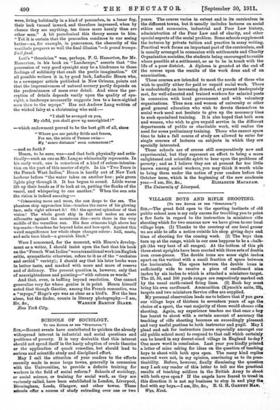VILLAGE BOYS AND RIFLE SHOOTING.
[To THE Emma Or THE "SPECTATOR."] SIR,—The great field open to the sporting instincts of old public school men is my only excuse for troubling you to print a few facts in regard to the instruction in miniature rifle shooting which for two seasons now we have given to our local village boys. (1) Thanks to the courtesy of our local grocer we are able to affix a notice outside his shop giving days and time of shooting for the coming week. (2) The boys then turn up at the range, which in our case happens to be a chalk- pit (the very best of all ranges). At the bottom of this pit three stout uprights have been erected with three sets of double iron cross-pieces. The double irons are some eight inches apart on the vertical with a small fraction of space between the horizontals. The space between the double irons is sufficiently wide to receive a piece of cardboard nine inches by six inches to which is attached a miniature target. The 25, 50, and 100 yards ranges are respectively marked out by the usual earth-raised firing lines. (3) Each boy must bring his own cardboard. Ammunition (Kynoch's axite, 22), targets and two miniature Service rifles are supplied.
My personal observation leads me to believe that if you gave our village boys of thirteen to seventeen 'years of age the choice of a sport, the vast majority of them would choose rifle shooting. Again, my experience teaches me that once a boy has learnt to shoot with a certain amount of accuracy the teaching of rifle shooting becomes an exceedingly pleasant . and very useful pastime to both instructor and pupil. May I plead and ask for instructors (more especially amongst our old public school men) to respond to that call which certainly can be heard in any decent-sized village in England to-day ? One more word in conclusion. Last year you kindly printed a letter of mine asking for ideas on the question of teaching boys to shoot with both eyes open. The many kind replies received were not, in my opinion, convincing as to its prat. ticability. Before, however, finally dismissing the question may I ask any reader of this letter to tell me the practical results of teaching soldiers in the British Army to shoot with both eyes open ? If the angels have feared to tread in this direction it is not my business to step in and play the fool with my boys.—I am, Sir, &e., E. G. H. GARNET MAN.
Wye, Kent.










































 Previous page
Previous page